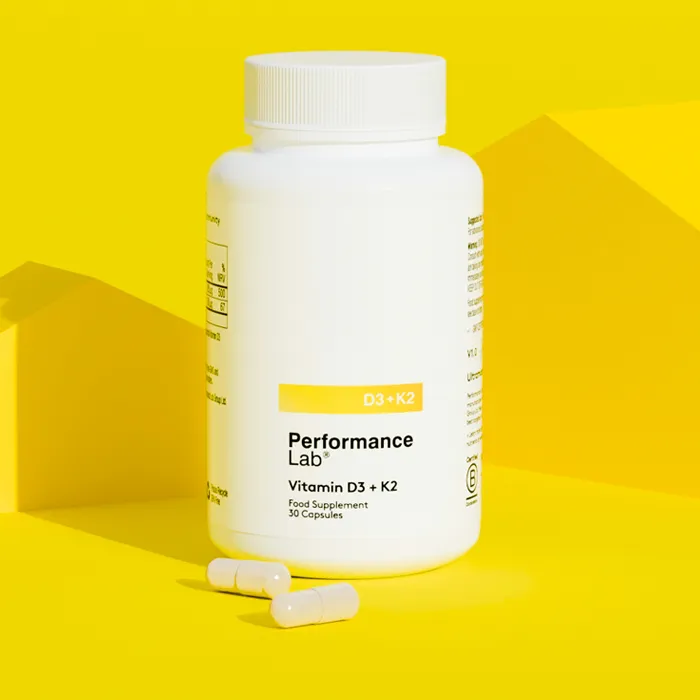If you’re here to find out when the best time to take vitamin D is, that’s music to our ears. It means you already know how important this particular vitamin is.
For those who don’t know as much about it, the best place to start is with this fact:
One billion people across the globe have a vitamin D deficiency .
And 50% of people have a vitamin D insufficiency.(1)
Why so many?
Because it’s difficult to get enough through diet alone. Especially if you follow a plant based diet.
This means a lot of us will need to look at vitamin D supplements in order to fill that gap.
But there's a few things you should know about your vitamin D supplement before you take it.
With vitamin D being a fat soluble vitamin, it’s essential to understand the best time to take it in order to get the most out of it.
We’ll cover the basics of vitamin D, tell you something you didn’t know and tell you when and how to take it to maximize its benefits.
Key Takeaways
- Fat‑soluble vitamins like vitamin D absorb better when taken with meals containing fats.
- Taking vitamin D on an empty stomach may reduce absorption and blood level benefits.
- Pairing vitamin D3 with vitamin K2 supports calcium routing and bone health.

What Is Vitamin D?

This is a really good question.
Vitamin D's alter ego is The Sunshine Vitamin - because the skin produces it when exposed to sunlight, specifically ultraviolet B (UVB) rays.
Vitamin D is a fat-soluble vitamin that also functions as a hormone.
Yep, more than just a vitamin, Vitamin D regulates calcium and phosphorus metabolism for bone health and influences over 2,000 genes. It also plays key roles in glucose metabolism, muscle health, hormone secretion, cell growth, and immune function.(2,3,4)
Benefits of Vitamin D
The vitamin D receptor is present in nearly every cell in the human body, suggesting its actions extend far beyond just bone health. Taking vitamin D with food can significantly increase vitamin d serum levels, with studies showing a 57% increase when taken with the largest meal of the day compared to taking it on an empty stomach or with a modest meal.
The global pandemic of low vitamin D levels primarily results from lifestyle factors limiting sun exposure. Still, insufficient intake of vitamin D-rich foods or malabsorption can also impair levels.
There’s no end to the benefits associated with vitamin D, but some of the main ones you should know about include:
Bone health

One of the most notable roles of vitamin D is in managing calcium and phosphorus levels, which are crucial for maintaining strong and healthy bones. Vitamin D helps your gut absorb calcium; without enough vitamin D and calcium, your body can start to draw calcium from your bones, leading to conditions like osteoporosis.(5)
Immune function

Ever been told to take vitamin D to prevent sickness? That's because vitamin D supports both the innate and adaptive immune systems. Low levels of vitamin D are linked to a higher risk of autoimmune conditions.(6, 7)
Better mood

Have you ever noticed that sunshine can lift your spirits? That’s partly due to vitamin D. Vitamin D receptors are present in areas of the brain that regulate mood. It helps produce serotonin, often called the “happy hormone”.(8, 9)
Reduces inflammation

Vitamin D not only supports your immune system but also helps reduce inflammation. It regulates the production of inflammatory cytokines and inhibits the growth of pro-inflammatory cells, which can help manage and prevent chronic inflammation.(10)
There’s no arguing that vitamin D is essential for good health—and these benefits are just a glimpse of its many roles.
If you can't get enough through diet or sunshine, taking a vitamin d supplement is the next best option.
So when should you be taking your daily supplements?
When Is The Best Time To Take Vitamins?

Not all vitamins are absorbed in the same way. If you don’t know your fat-soluble from your water-solubles, you might be missing out on their full range of benefits. Studies have shown that taking vitamin D with the largest meal of the day can significantly increase the average vitamin D level, with participants' levels rising from 31 ng/ml to 47 ng/ml. Each type has guidelines for when to take them for optimal absorbency.
Water-soluble vitamins
These are, as they sound, soluble in water; they dissolve quickly and are readily absorbed into the bloodstream, entering your system's circulation efficiently.
These include the eight B vitamins and vitamin C, which support metabolism, energy production, and cell growth.
Since they can’t be synthesized in the body, they must be obtained through diet or supplements. Generally, water-soluble vitamins can be taken on an empty stomach or with food, but B vitamins may cause nausea in some people; if this happens to you, take them with a small meal.
Fat-soluble vitamins
Fat-soluble vitamins, including A, D, E, and K, require fat for absorption. They are absorbed into lacteals in the small intestine via chylomicrons before being transported through the lymphatic system into the bloodstream.(11)
These vitamins are stored in the body, so excessive intake can lead to toxicity due to delayed elimination.(12)
To boost absorption, consume fat-soluble vitamins with meals or take them in liquid form emulsified in fat on an empty stomach.
Should Vitamin D Be Taken With Food?

Ideally, yes.
Vitamin D is a fat-soluble vitamin and isn’t well absorbed without a fat source. Therefore, it’s recommended to take it with food unless it’s emulsified with fat.
Why Take Vitamin D With Food ?
A couple of studies point to the importance of having a fat source alongside vitamin D to ensure optimal absorption. A study showed that the average vitamin D level increased from 31 ng/ml to 47 ng/ml when taken with the largest meal of the day. Another study found a 57% increase in vitamin D serum levels when taken with the largest meal of the day compared to taking it on an empty stomach or with a modest meal.
A 2014 study found that vitamin D3 absorption was 32% higher when taken with a meal containing fat, especially monounsaturated fats, compared to a fat-free meal.(13)
-
A 2010 study showed a 57% increase in vitamin D3 levels when taken with the largest meal of the day versus an empty stomach or a small meal.(14)
-
For those who rely on vitamin D from a multivitamin or mineral supplement, ensure your supplement comes with natural cofactors so your body can recognize and absorb it.
NutriGenesis® Multi, and Performance Lab® D3 + K2, all contain bioidentical nutrients complexed with natural cofactors that enhance absorption. This makes them identical to the nutrients you find in nature. Which means our bodies know what to do with them, to get the best out of them.
Shop Performance Lab® NutriGenesis®

FAQS
Q: Can you get too much Vitamin D
A: Yes, excessive intake can lead to toxicity, causing symptoms like nausea, weakness, and kidney damage. Stick to the recommended daily allowance unless directed otherwise by a healthcare provider. Avoid taking high-dose supplements without medical supervision.
Q: What is the Recommended daily allowance?
A: The RDA for adults is 600-800 IU (15-20 mcg) per day, depending on age and health conditions. Aim to meet your daily needs through a combination of diet, sunlight, and supplements if necessary.
Q: What are the symptoms of Vitamin D deficiency?
A: Common symptoms include fatigue, bone pain, muscle weakness, and mood changes like depression. If you experience these symptoms, consider getting your vitamin D levels checked by a healthcare professional.
Q: How can I increase my Vitamin D levels naturally?
A: You can increase your levels by spending time in the sun, eating vitamin D-rich foods (like fatty fish, fortified dairy products, and egg yolks), and taking supplements if needed. Aim for about 10-30 minutes of midday sun exposure several times a week. Always use sun protection to avoid skin damage.
You might also like:
Vitamin D3 Dosage for Weight Loss
How Long Does Vitamin D Take to Work?
Can You Get Vitamin D Through A Window? - 4 Tips for Getting Your Daily Dose
4 Reasons You Should Take Omega 3 with Vitamin D
References
-
Nair R, Maseeh Vitamin D: The “sunshine” vitamin. J Pharmacol Pharmacother. 2012;3(2):118-126.
-
Hossein-nezhad A, Holick MF. Vitamin D for health: a global perspective. Mayo Clin Proc. 2013;88(7):720-755.
-
Ceglia L. Vitamin D and its role in skeletal muscle. Curr Opin Clin Nutr Metab Care. 2009;12(6):628-633.
-
Bikle D. Nonclassic actions of vitamin D. J Clin Endocrinol Metab. 2009;94(1):26-34.
-
Lips P. (2012). Interaction between vitamin D and calcium. Scandinavian journal of clinical and laboratory investigation. Supplementum, 243, 60–64.
-
Munger KL, Levin LI, Hollis BW, Howard NS, Ascherio Serum 25-hydroxyvitamin D levels and risk of multiple sclerosis. JAMA. 2006;296(23):2832-2838.
-
Eyles DW, Smith S, Kinobe R, Hewison M, McGrath JJ. Distribution of the vitamin D receptor and 1 alpha-hydroxylase in human brain. J Chem Neuroanat. 2005;29(1):21-30.
-
Patrick RP, Ames BN. Vitamin D and the omega-3 fatty acids control serotonin synthesis and action, part 2: relevance for ADHD, bipolar disorder, schizophrenia, and impulsive behavior. FASEB J. 2015;29(6):2207-2222.
-
Yin K, Agrawal DK. Vitamin D and inflammatory diseases. J Inflamm Res. 2014;7:69-87.
-
Yousefi Rad E, Djalali M, Koohdani F, et al. The Effects of Vitamin D Supplementation on Glucose Control and Insulin Resistance in Patients with Diabetes Type 2: A Randomized Clinical Trial Study. Iran J Public Health. 2014;43(12):1651-1656.
-
Escobedo N, Oliver The Lymphatic Vasculature: Its Role in Adipose Metabolism and Obesity. Cell Metab. 2017;26(4):598-609.
-
Ravisankar P, Reddy AA, Nagalakshmi B, Sai Koushik O, Vijaya Kumar B, Sai Anvith P. The Comprehensive Review on Fat Soluble Vitamins. IOSR Journal Of Pharmacy. 2015; 5(11):12-28.
-
Dawson-Hughes B, Harris SS, Lichtenstein AH, Dolnikowski G, Palermo NJ, Rasmussen H. Dietary fat increases vitamin D-3 absorption.J Acad Nutr Diet. 2015;115(2):225-230.
-
Mulligan GB, Licata A. Taking vitamin D with the largest meal improves absorption and results in higher serum levels of 25-hydroxyvitamin D. J Bone Miner Res. 2010;25(4):928-930.















